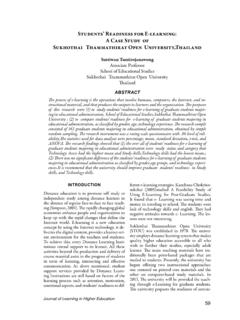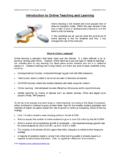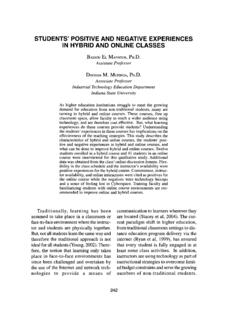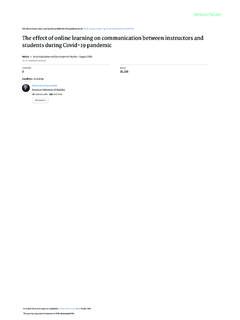Transcription of UNDERSTANDING MODULAR LEARNING - DEVELOPING A …
1 UNDERSTANDING MODULAR LEARNING - DEVELOPING A STRATEGIC PLAN TO EMBRACE CHANGEBy*_**_** Kaplan UniversityABSTRACTThe purpose of this descriptive paper was to explore and synthesize literature related to UNDERSTANDING MODULAR LEARNING and how it can be implemented effectively so faculty members embrace its use. An in-depth review of literature addressed topics including, Educational Theories supporting MODULAR LEARNING , the development of MODULAR LEARNING , and innovations in education and technology. Researchers analyzed language patterns used in the literature to develop a common language for and UNDERSTANDING of the concept.
2 Analysis and recommendations as well as a proposed definition of MODULAR LEARNING are : MODULAR LEARNING , Organizational Change, Innovation, Online LEARNING , Technology, FRIESTAD-TATE * CAROL SCHUBERT ** CRAIG MCCOY **INTRODUCTION Change is the only constant in life. These words spoken by Greek philosopher Heraclitus (535 BCE) still resonate in the minds of people dealing with the forces of change in the 21st century. Change is often initiated with a word or phrase to set the stage of what is to come.
3 Organizational decision-makers often introduce a change initiative with what is commonly called a buzzword to start the conversation. Often there is confusion on the meaning of buzzwords or concepts. Leaders of change may assume that everyone has a shared UNDERSTANDING of these words, but often this is a false assumption. For people to effectively embrace a change initiative, it is important to elucidate a deeper UNDERSTANDING of the words that frame the language of change and properly set the stage on which a change initiative is launched.
4 Using the buzzwords to initiate change is a common organizational problem. Chaudron (2013) succinctly describes the ill effect of using buzzwords to initiate change as a whip saw effect that causes mass confusion among employees. These buzzwords are often a technique applied with no clear focus as to the why, expected results, or return on investment . Regardless of the nature of the business, every organization is bombarded with change based on the word du'jeur. Each and every organizational context has its own collection of buzzwords such as just-in-time, total quality, and empowerment.
5 Because using buzzwords to initiate change is a common organizational problem that cuts across industries, this research project should be of interest and value to a wide audience in both the process to define a buzzword as well as how to share information with stakeholders to find higher levels of success in its implementation. One such buzzword being used within an online graduate program is MODULAR LEARNING . While MODULAR LEARNING is at the heart of current change initiatives, currently, there is potential miscommunication among faculty and administrators on the meaning of the concept.
6 It is important to reach a common definition regarding MODULAR LEARNING as the concept is being a larger context, researchers believe it is a worthy endeavor to investigate the thinking that underlies any term or phrase that is used to initiate and frame change. The intent of this paper is to develop a greater UNDERSTANDING of the concept of MODULAR LEARNING as it applies to an online university seeking to improve and expand the LEARNING process, and also to provide take-away lessons that can be applied in other change of initiatives.
7 Further, the intent of this paper is to emphasize the importance of creating a RESEARCH PAPERS32li-manager s Journal o , Vol. No. 4lnSchool Educational Technology 9 March-May 2014 shared, a common UNDERSTANDING of MODULAR LEARNING as a means for organizational members to better embrace the dynamics of change by reviewing the literature. The context for this change initiative is an online university, specifically a graduate business program. Academic and corporate leaders of this institution are seeking to optimize educational opportunities by modularizing the current academic curriculum.
8 The aim is to improve the delivery of current academic courses for greater student success as well as supply employers with future employees who possess specific skills and knowledge required in various industries. The university hopes to reach out to prospective business-to-business partners who value in connecting with the online university to deliver professional training and development for their employees. Statement of the ProblemOften organizational change movements are initiated with a buzzword . The leader who begins a change process may have his or her own definition and ideas behind the buzzword, but it is unlikely that others share that knowledge and may have a different interpretation of what the word(s) mean.
9 Simply, there is not common UNDERSTANDING of the buzzword terms. When this happens, it does not bode well for others to embrace the change effectively. This paper will help to counter that issue by DEVELOPING a strategic plan to elucidate supportive language patterns found in the literature so that greater common UNDERSTANDING is increased and embracing change is enhanced. Seeking language patterns to embrace changeThe patterns of specific words can influence how individuals perceive a change. A single term or buzzword used to initiate change may be perceived to be universally understood, but often this is not the case.
10 For example, the full meaning of the buzzword improving leadership is impossible to convey and understand if this is how a leadership change initiative being is introduced. The people who will be charged with DEVELOPING and implementing improved leadership may be asking questions like: What type of leadership?. Servant leadership? Transformational leadership? Situational leadership? Leadership according to whom? Popular authors and speakers? Corporate gurus? Academic writers? Military authorities? Historical figures? Religious figures, etc.














